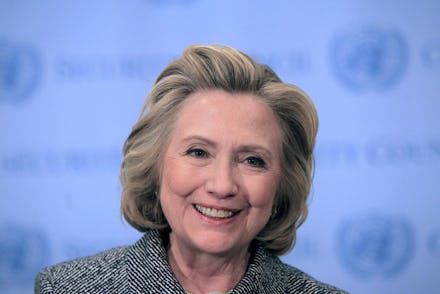7 Sexist Attacks Hillary Clinton Faced in 2008 — and How She Can Combat Them in 2016

She isn't compassionate; she's "nagging." She isn't outspoken; she's "shrill." She isn't tough; she's a "bitch."
Hillary Rodham Clinton may be a former first lady, senator and secretary of state, but her position as the bête noire of misogynist talking heads and insecure manchildren is one role from which she can't be promoted. From her first appearance on the national stage in 1992 on the arm of a future president, Clinton has faced an unending litany of gender-based criticism and calumny. She's at once too "emotional" and too "cold," both "ruthless" and "weak," a "harpy" whose grandchild is simultaneously a dangerous distraction and a political prop. The most bizarre label: Clinton is too "ambitious" to be the first female president, a charge so ridiculous that it became an Onion article.
Unfortunately for Clinton, the effectiveness of these charges isn't predicated on their consistency. According to an in-depth Gallup poll released in March 2014, of the long list of the "worst or most negative" things about a potential Clinton presidency (including "too old" and "just don't like her") antipathy toward a female commander-in-chief was ranked second from the top:
The biggest negative? "Not qualified," an interesting criticism in light of her eight years as a senator and four as secretary of state, a position served under a president with only four years of experience as a senator his own election to the presidency. Even excluding her experience as first lady — a position arguably more politically demanding than most seats in Congress — her decade-plus of government service would make Clinton the most qualified president in terms of prior experience since George H.W. Bush.
During her ill-fated first presidential campaign, Clinton faced a near-constant torrent of sexist comments and critiques. Even eight years later, the profound sexism of comments about her body, age, voice and general possession of an XX chromosome are nearly impossible to fathom:
Let no American voter be forced to confront the horrors of a woman aging naturally. Perhaps Clinton should consider dying her hair jet black into her late 80s, like some presidents.
And Fox News commentator Marc Rudov should know — after all, he wrote Under the Clitoral Hood: How to Crank Her Engine Without Cash, Booze or Jumper Cables.
Putting the onus of sexism on nameless "voters" was a great way of passing the buck on misogyny in 2008. "I'm not saying that her voice bothers me, but think of the voters!"
First wives cracks? Seriously? Maybe MSNBC contributor Mike Barnicle should stick to plagiarizing George Carlin jokes.
This, after Chris Matthews publicly promised to "never underestimate" Clinton.
Every time a TV viewer is forced to consider Tucker Carlson crossing his legs, an angel loses its wings.
It wasn't just careless talking heads — staid print organizations got in on the fun too.
This time, however, Clinton can beat the sexism back. On the 2008 campaign trail, Clinton was largely hesitant to highlight her gender, at least initially. Ignoring her gender was a considered political wager — then-Sen. Barack Obama had cornered the market on historic candidacies, and Clinton's 2006 run for Senate had reportedly featured gender-based criticism coming from her own opponent (the opponent in question, John Spencer, later denied speculating that Clinton had cosmetic surgery) that distracted from her messaging. Better to focus on proving her toughness than to fan the flames of sexist critics, the Clinton camp posited, which would leave them open to anti-feminist tirades that put the candidate's gender front and center.
But the strategy backfired. When she finished third in the Iowa caucuses in 2008, Clinton lost women to Obama by five percentage points. The week after her loss, however, the Clinton campaign was pleasantly surprised when one of her most "humanizing" moments of the 2008 primaries was also one of her most stereotypically feminine.
In response to an empathetic New Hampshire voter who asked Clinton how she remained so upbeat and "so wonderful" in the face of the rigors of campaigning, the candidate got choked up in frustration and exhaustion after a hard loss in the Iowa caucuses. It was, in the words of the Washington Post, "dignified, yet human."
From that moment on, the Clinton campaign retrenched as a movement of "girl power," up to and including her concession speech, wherein she famously described every vote cast for her in the Democratic primaries as a crack in "that highest, hardest glass ceiling."
This time, the Clinton team appears not just prepared, but excited to embrace the historic nature of her candidacy. In the years since she stepped down as secretary of state, Clinton has spoken freely about the importance of women breaking barriers. Her first public remarks after leaving the State Department was an address about the "untapped potential" of women around the world. It's a smart move politically — since the advent of national exit polling in 1972, no Democrat has ever won the presidency with the support of a majority of white women.
In a 2013 speech at Bryn Mawr on the role of women in public service, the former first lady told students at the all-women's college about the importance of female political leaders to the nation's future. "Bryn Mawr is Welsh for 'big hill,'" Clinton said. "We still have a long way to go and a big hill to climb. If this was easy, it would have already been done. Let's keep our eye on the goal."